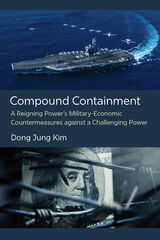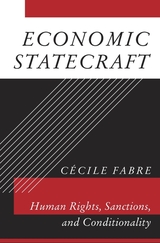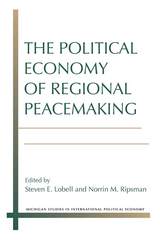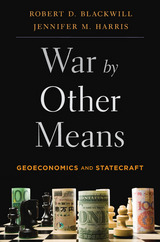
When does a reigning great power of the international system supplement military containment of a challenging power by restricting its economic exchanges with that state? Scholars of great power politics have traditionally focused on examining a reigning power’s military containment of a challenging power. In direct contrast, Compound Containment demonstrates that these conventional studies are flawed without a sound understanding of the multilayered aspects of containment strategy in great power politics. Since economic capacity and military power are intimately linked to one another, countering a challenging power requires addressing both economic and military dimensions. Nonetheless, this nexus of security and economy in a reigning power’s response to a challenging power cannot be explained by traditional theories that dominate research in international security. Author Dong Jung Kim fills a gap in the scholarship on great power competition by investigating when a reigning power will make its military containment of a challenging power “compound” by simultaneously employing restrictive economic measures. Its main theoretical claims are corroborated by an analysis of key historical cases of reigning power-challenging power competition. This book also offers policy prescriptions for the United States by examining whether the United States is in a position to complement military containment of China with restrictive economic measures.

At least since Athenian trade sanctions helped to spark the Peloponnesian War, economic coercion has been a prominent tool of foreign policy. In the modern era, sovereign states and multilateral institutions have imposed economic sanctions on dictatorial regimes or would-be nuclear powers as an alternative to waging war. They have conditioned offers of aid, loans, and debt relief on recipients’ willingness to implement market and governance reforms. Such methods interfere in freedom of trade and the internal affairs of sovereign states, yet are widely used as a means to advance human rights. But are they morally justifiable?
Cécile Fabre’s Economic Statecraft: Human Rights, Sanctions, and Conditionality provides the first sustained response to that question. For millennia, philosophers have explored the ethics of war, but rarely the ethics of economic carrots and sticks. Yet the issues raised could hardly be more urgent. On what grounds can we justify sanctions, in light of the harms they inflict on civilians? If, as some argue, there is a human right to basic assistance, should donors be allowed to condition the provision of aid on recipients’ willingness to do their bidding?
Drawing on human rights theories, theories of justifiable harm, and examples such as IMF lending practices and international sanctions on Russia and North Korea, Fabre offers a defense of economic statecraft in some of its guises. An empirically attuned work of philosophy, Economic Statecraft lays out a normative framework for an important tool of diplomacy.

The economic sanctions imposed on Iraq from 1990 to 2003 were the most comprehensive and devastating of any established in the name of international governance. The sanctions, coupled with the bombing campaign of 1991, brought about the near collapse of Iraq’s infrastructure and profoundly compromised basic conditions necessary to sustain life.
In a sharp indictment of U.S. policy, Joy Gordon examines the key role the nation played in shaping the sanctions, whose harsh strictures resulted in part from U.S. definitions of “dual use” and “weapons of mass destruction,” and claims that everything from water pipes to laundry detergent to child vaccines could produce weapons. Drawing on internal UN documents, confidential minutes of closed meetings, and interviews with foreign diplomats and U.S. officials, Gordon details how the United States not only prevented critical humanitarian goods from entering Iraq but also undermined attempts at reform; unilaterally overrode the UN weapons inspectors; and manipulated votes in the Security Council. In every political, legal, and bureaucratic domain, the deliberate policies of the United States ensured the continuation of Iraq’s catastrophic condition.
Provocative and sure to stir debate, this book lays bare the damage that can be done by unchecked power in our institutions of international governance.

The chapters that follow are grouped in three sections, corresponding to the three stages of peacemaking: reduction or management of regional conflict; peacemaking or progress toward a peace treaty; and maintenance of bilateral peace and the regionalization of the peace settlement. In each chapter, the contributors consider the five key questions from a variety of methodological, historical, cultural, and empirical perspectives, drawing data from the Pacific, the Middle East, Europe, Asia, and Latin America. The conclusion expands on several themes found in the chapters and proposes an agenda for future research.

A Foreign Affairs Best Book of 2016
Today, nations increasingly carry out geopolitical combat through economic means. Policies governing everything from trade and investment to energy and exchange rates are wielded as tools to win diplomatic allies, punish adversaries, and coerce those in between. Not so in the United States, however. America still too often reaches for the gun over the purse to advance its interests abroad. The result is a playing field sharply tilting against the United States.
“Geoeconomics, the use of economic instruments to advance foreign policy goals, has long been a staple of great-power politics. In this impressive policy manifesto, Blackwill and Harris argue that in recent decades, the United States has tended to neglect this form of statecraft, while China, Russia, and other illiberal states have increasingly employed it to Washington’s disadvantage.”
—G. John Ikenberry, Foreign Affairs
“A readable and lucid primer…The book defines the extensive topic and opens readers’ eyes to its prevalence throughout history…[Presidential] candidates who care more about protecting American interests would be wise to heed the advice of War by Other Means and take our geoeconomic toolkit more seriously.
—Jordan Schneider, Weekly Standard
READERS
Browse our collection.
PUBLISHERS
See BiblioVault's publisher services.
STUDENT SERVICES
Files for college accessibility offices.
UChicago Accessibility Resources
home | accessibility | search | about | contact us
BiblioVault ® 2001 - 2024
The University of Chicago Press









